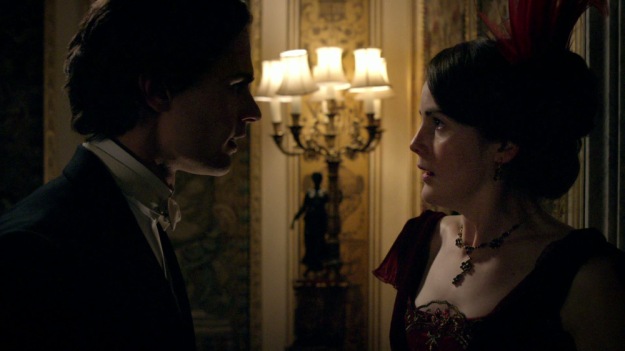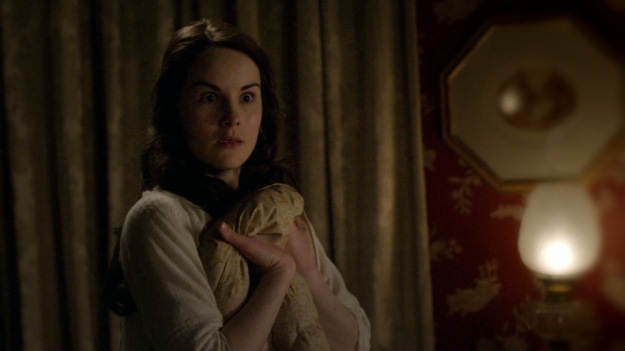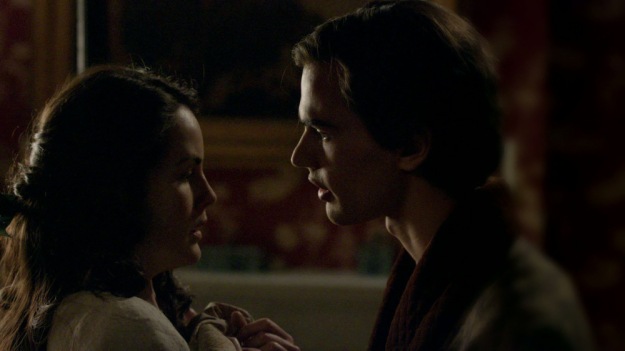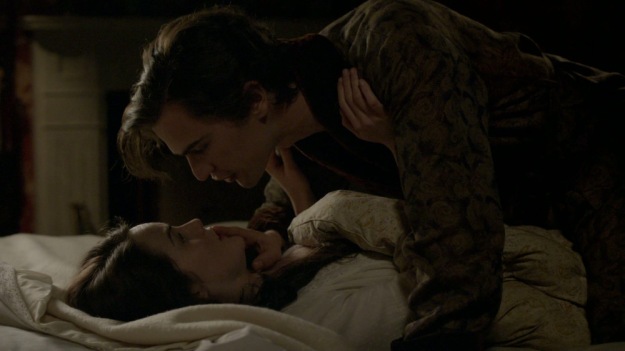As we draw closer to the premiere of Downton Abbey for its fourth season, I wanted to reflect (and rant a little bit) about a key moment for Lady Mary Crawley (Michelle Dockery) in the first season which unquestionably altered her life: her sexual encounter with Kemal Pamuk (Theo James), the son of a Turkish diplomat and a guest at Downton. I hope this will be the first of several scene studies primarily focused on Mary’s journey, as she is my favorite character (sorry Daisy/Matthew/Violet/everyone).
I, like many other viewers, glossed over the details of this incident — in the wake of Pamuk’s demise immediately following — but realized the depravity of his actions upon repeat viewings. But before moving on, we must, for academic purposes, agree that he and Mary did actually have sex before his ill-timed death, which was not obvious to some viewers. A note from writer/executive producer/creator Julian Fellowes clears the air on the subject:
“In the edit, the Powers made a cut we all came to regret. After commenting that Mary ‘could still be a virgin for your husband’, which stayed in, Kemal was supposed to say: ‘A little imagination, a phial of blood hidden beneath the pillow, you wouldn’t be the first.’ But this was excised. Despite arguing fairly passionately, I could not convince them the lines were needed. I explained that, without them, it was anyone’s guess what Kemal was doing to Mary that would leave her virginity intact. But they were confident that no one would make any untoward connection. ‘Nobody will think that,’ they said. But everyone thought it.”
We also must set aside any perceptions we have of Mary before this interaction with Pamuk. As she comes on very strong in early Downton days, a person’s perception of Mary can be a barrier for fully understanding what happened to her. She is not a frigid bitch deserving of her fate, nor is she an angel whose wings have been ripped from her back. She is simply, for these purposes, a woman in 1913.
As I’ve said, I re-watched this scene a few times in various settings before I realized the true nature of this incident, perhaps because we don’t dwell on “Mary’s indiscretion” for too long before having to deal with a dead body in the room. Of course, we revisit that issue later when Cora reprimands Mary and holds said indiscretion over her head for quite some time, but our initial processing of the whole situation is interrupted by Pamuk’s death, and we really forget what happens.
Earlier this year, a fan of the show created a breakdown of this scene, which can be seen here, to demonstrate the perversion of this encounter and to display Mary’s duress and coercion. Breakdowns like these are extremely helpful, but I wonder at the extent to which we have to go to shed light on what we should see as clearly depraved. Do we have to tally up every time she says no or pushes him away? Fifteen “no’s” before a “yes” is not consent. One “no” before a “yes” is still not consent.
The argument that it was “more complicated than rape” is one I hear often. It was complicated, but it was also rape; they’re not mutually exclusive. Mary chose to have sex with Pamuk, but she made that choice under duress. She could not give true consent because she no longer had an option to refuse his advances. The element of coercion — the fact that he was not going to take “no” for an answer — makes it rape.
In the interest of historical context, let’s note that the understanding of rape in 1913 was different than ours in 2013. Traditionally, rape was a crime in English law in that the victim was required to “prove a continued state of physical resistance”. The penalty of rape was death, as outlined in the 1828 Offenses Against the Person Act. In 100 years, we’ve learned that rape is not just about physical force. Mary tells her mother Cora she wasn’t “forced” and accepts “responsibility,” but Mary doesn’t have the framework to understand coercion or anything other than physical-force-as-rape. We, however, with our advanced understanding, cannot write it off.
Now, acknowledging that she was coerced — that she had only the illusion of choice — is not erasing her agency or her attraction to Pamuk (though her attraction to him and/or desire to sleep with him is irrelevant). The fact that she vaguely claims agency afterwards — to her mother, to Matthew, to anyone — does not change the fact that she couldn’t consent beforehand, and consent can’t be given retroactively.
In his footnotes on this scene in the Downton Abbey season one script book, Julian Fellowes doesn’t explicitly write, “and this is where Pamuk rapes Mary.” But it doesn’t matter whether Fellowes wrote it specifically to be — and look like — rape. It doesn’t matter that Michelle Dockery isn’t talking about it in every interview or industry panel about this show. If you understand what rape is, you understand that this is rape, and no matter what, that it isn’t okay. Let’s call a spade a spade.



